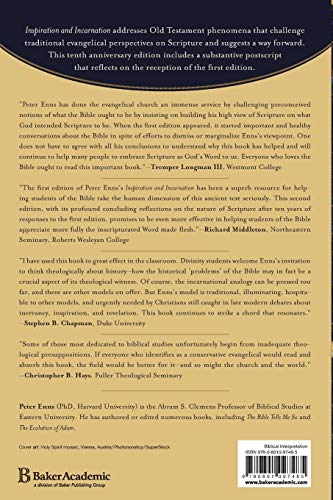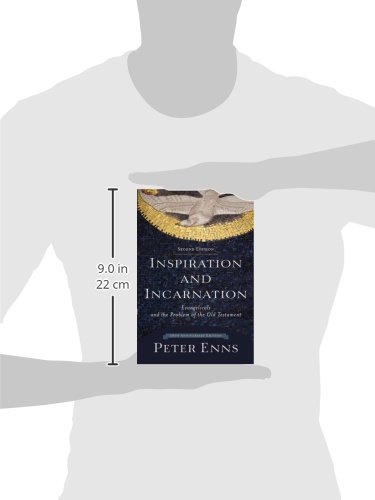Customer Services
Copyright © 2025 Desertcart Holdings Limited
Desert Online General Trading LLC
Dubai, United Arab Emirates




Inspiration and Incarnation: Evangelicals and the Problem of the Old Testament
V**Y
Thought-Provoking Read
As a first-year seminary student, I was assigned this book for my OT course with no previous knowledge of Enns or his work as an Old Testament scholar. I can say that Enns will have a spot on my bookshelf moving forward from today. The presentation of biblical texts with little commentary in some areas was refreshing; I was able to think through the implications of what I was reading without being overwhelmed by more thoughts. Somehow, I am not walking away dejected by ‘contradictions’ in the Bible; instead, I am walking away with a deeper and richer appreciation of the Bible and with more awe for a God who would deign to enter our human contexts. This book is worth the read.
T**7
An Eye-Opener About The Bible
Peter Enns masterfully attempts to answer the question “what is the Bible?” in this book. If we were marooned on an island without ever having seen the Bible, and upon being rescued, we’re handed the Bible, our impressions of it would be that the Bible seems ancient, speaking of an ancient time, that it seems to vary in parts, and seems like it is in need of interpretation. Yet many who have been exposed to portions of the Bible read it as if it were written yesterday, that it is perfect, without contradictions and without flaws.As someone who deconstructed faith myself, I had to, as someone who wished to remain Christian, wrestle with what to do about this collection of books and letters. How do we read this collected work, written by people, as seriously and as thoughtfully as it should be? Peter Enns does a masterful job of that, taking the incarnation and working with the mystery of human-divine, posits a theology of Scripture that really seems to work. In this book, explaining what the Bible is, and his later book “How the Bible Actually Works”, I have found a framework that makes the Bible come alive, to speak to me in ways that the static, cold, mechanical rule book, instruction manual, inerrantist/infalliblist framework just couldn’t. It is worth a read, and I wish I had bought it in hard copy. I might still do that.
M**T
A Great Book to help you better read the Good Book
Far from being any kind of expert regarding the Bible, I still consider myself as pretty much a novice when it comes to Biblical studies and/or theology. Not only that, I grew up as a Catholic in the 1960s, which means I didn't grow up with the Bible-focus of Protestants, whatever stripe they might be. I came to Biblical studies somewhat haphazardly, with what came to hand, and I now appreciate more fully what I knew then, that some of my early theology books were a bit over my head. And that goes for Old Testament as well as New Testament.So how could I pass up a book about Christians and the "Problem of the Old Testament?" Now that I've read this book, I wish I had been able to read Inspiration and Incarnation a lot earlier in my (still continuing) introduction to Biblical studies. I still catch myself reading about something for a few pages and then realizing I didn't quite understand all the concepts being discussed in those pages. Luckily, Enns provides a very good glossary at the end of the book. I will be keeping this book handy, partly because I know I'll being using that glossary while I'm reading other theology books.This was not an easy book to write, for two reasons. First, it deals with issues that are not only complicated--to put it mildly--and he wrote it not for graduate-level specialists, but for the rest of us who care about Scripture and want to know how to read it in the hopes that the Holy Spirit will speak to us through it. Second, those complicated issues are the kinds that can break up families, individual churches, and even large denominations. Just how true that was is evidenced by the fact that the publication of this book would eventually lead to Enns losing his tenured position as a theologian at a Christian school.Given that this is a tenth anniversary edition, and that it is being used in colleges and seminaries across the land--and probably across the ocean as well--I don't feel its necessary to provide any big summary of it. If I was, there are a lot of quotes I would be giving here. I highlighted lots of passages, and copied a number of them into the notes I took. I know I'll be going back to parts of it from time to time.Two things really struck me at the end of chapter four. Here I will provide a short quote: biblical interpretation is at least as much an art as it is a science. (150) And I agree wholeheartedly with a follow-up to that, in which Enns stresses that biblical interpretation is not ultimately an individual enterprise, but something that grows out of our participation in the family of God.From those two related points, Enns gets to something that really spoke to me: biblical interpretation is a path that we take, and it is a path that requires patience and humility. But the ultimate end, he reminds us, is not to learn about ancients texts, but rather to learn about God. (152)I think that this book is a useful if not downright necessary volume to have with us as we make our way along that path.
J**E
Grateful For Commiting to Print Where My Thinking Was Going
I appreciate Enns' work in giving permission to see the Bible as the Word of God in a more true-to-form light, free of the assumption that it must be without error or discrepancy for it to be the Word of God. Placing our modern expectations and assumptions upon the Bible helps no one, and actually demonstrates a low view of Scripture compared to allowing the Bible to simply tell us what it is and the God who stands behind it. Enns' premise that the Bible should be seen through the model of incarnation is healthy, sound, and carries the full weight of Christ's incarnation behind it. The Bible is a divine AND human book, the same great partnership that exists in the lives of believers both then and now.
W**C
Amazing
I'm gonna sound like a shill here: I have a huge theological library, and this has opened my eyes to a whole new understanding. Again, amazing is the best word I have. I'd give it a 6 if I could.
J**.
Addresses key questions I had
Peter Enns’ humility and extensive knowledge comes through on every page. He gives wonderful background information and discusses various perspectives, keeping at the forefront academic and spiritual integrity. Some parts harder to follow for a layperson but worth the effort.
B**T
Makes a variety of well-researched arguments that are too strong to be dismissed
The most troublesome and distressing thing about this book is not its contents, or Enn's statements - it's that all criticism of it I could find (especially the criticism of it that led to Enns' ejection from Westminster) smacks of hysteria, fear, knee-jerk reaction and a lack of direct engagement with the well-researched scholarly arguments at the core of this book.When the best your opponents can offer is hysteria over the *implications* of your argument, rather than well-researched rebuttals of your *actual* argument, that's a clear signal your opponents don't actually have good rebuttals.
S**H
When the Fog Clears, Take a Step
Certain questions have always plagued my mind. Questions pertaining to ancient texts, similar to the Genesis account, the flood story, and certain discrepancies in the text and even what seemed like blatant errors in some of the verses have been a subject of my musing for a couple of years now. I was recommended this book as I start my journey down the hermeneutical path. This book indeed answered so many old questions and ones that I didn’t know I had, and brought an immense perspective shift, as it always does when reading deeper into theology with the right heart and openness to challenging ideas and previous constructs. Yes my theology has obtained an additional lens of clarity, but what is most important, is that through this, my relationship with Jesus has been strengthened. I am very pleased with this read, and I would greatly recommend this book to anyone wanting to start the journey of asking the right questions. Though sometimes I feel like I’m walking on stones in the middle of a foggy lake of theology and biblical exegesis, this book Peter Enns has written, has shown me the next stone to step to, and for that I’m immensely grateful.
M**H
Great book.
Insightful, inventive, ultimately convincing. Great book.
K**R
A very helpful approach to Biblical interpretation and understanding.
Enns is spot on. However, his incarnational metaphor applied to the Scriptures is, as I understand it, the reason why Enns got fired from Westminster Theological Seminary. Shame on you, Westminster!
Trustpilot
1 week ago
2 months ago